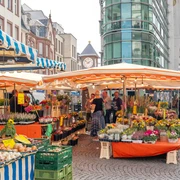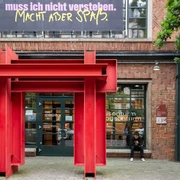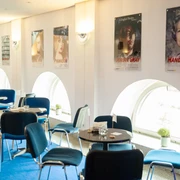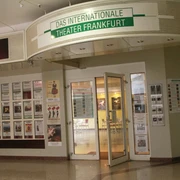Good for the laugh muscles: Frankfurt's only political-literary cabaret brings intelligent humour and sharp-tongued punchlines to the stage.
The name alone is a sign of fine humour. Because Frankfurt's only political-literary cabaret theatre has nothing to do with cheese. Instead, "Käs" is the abbreviation for "Kabarett Änderungsschneiderei", the first German-Turkish cabaret theatre in Germany. When Şinasi Dikmen and his wife Ayşe Aktay opened the venue in 1997, they staged a play in which Dikmen played with a typical cliché and mimed a Turkish tailor in Germany – so successfully that the programme became the name. Humorous clichés, political analyses with puns and pointed portrayals of social idiosyncrasies still characterise the repertoire today.
Almost everyone who has made a name for themselves in the German-speaking cabaret scene has appeared on stage, including Josef Hader, Dieter Hildebrandt, Gerhard Polt, Lisa Fitz and Urban Priol. Cabaret, comedy and musical pieces round off the programme.
The stage is housed in the former factory hall of the Naxos-Union, the audience sits on chairs and benches with tables, where food and drinks are also served during the performance.
The name alone is a sign of fine humour. Because Frankfurt's only political-literary cabaret theatre has nothing to do with cheese. Instead, "Käs" is the abbreviation for "Kabarett Änderungsschneiderei", the first German-Turkish cabaret theatre in Germany. When Şinasi Dikmen and his wife Ayşe Aktay opened the venue in 1997, they staged a play in which Dikmen played with a typical cliché and mimed a Turkish tailor in Germany – so successfully that the programme became the name. Humorous clichés, political analyses with puns and pointed portrayals of social idiosyncrasies still characterise the repertoire today.
Almost everyone who has made a name for themselves in the German-speaking cabaret scene has appeared on stage, including Josef Hader, Dieter Hildebrandt, Gerhard Polt, Lisa Fitz and Urban Priol. Cabaret, comedy and musical pieces round off the programme.
The stage is housed in the former factory hall of the Naxos-Union, the audience sits on chairs and benches with tables, where food and drinks are also served during the performance.
Nearby







